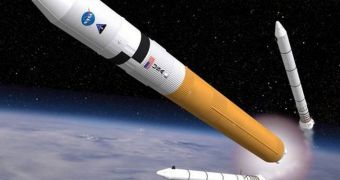Congressmen from the Senate science committee did not issue a subpoena they recently threatened NASA with this Monday, deciding to give the American space agency some leeway with preparing documents explaining how it will go about building a new heavy-lift rocket by 2016.
This was one of the congressional compromises that were made in October 2010, which called for NASA to build a new massive rocket for space exploration, while at the same time supporting the development of commercial spaceflight.
Documents related to the new rocket, which was supposed to be the equivalent of the ARES V delivery system that was supposed to be built under the now-canceled Project Constellation, were no forwarded to the committee on time.
Authorities threatened on Wednesday, June 29, that they will serve NASA with a subpoena, effectively forcing it to submit all the documentation it has on the new delivery system. But the agency has already sent hundreds of pages of text, which are now being reviewed.
“The agency is working to respond to the Senate commerce committee request and compiling the records requested,” NASA spokesman J.D. Harrington announced on Monday, June 27.
The threat to subpoena the agency was made by the chairman of the Senate science committee, Senator Jay Rockefeller (D., West Virginia) and Kay Bailey Hutchison (Texas), the top Republican on the committee, Space reports.
According to the two, NASA failed to provide an adequate amount of information about its plans to build the new rocket. They even suspect that the agency is not fully committed to the new plans.
But Charles Bolden, the NASA Administrator, sent a letter to the officials on Thursday, saying that the agency had already sent hundreds of pages of documents to committee staffers. Experts at NASA are also in constant communication with the former.
Congress agreed to finance the development of the new rocket with $10.8 billion over the next three years, so that the spacecraft is ready by 2016. But Obama's budget plan calls for only $2.8 billion to be spent annually.
The President also calls for private spaceflight to receive $850 million annually, rather than the $500 million Congress proposed. The exact manner in which the taxpayer dollar will be distributed has not yet been decided, but analysts say that the battle will be rough.

 14 DAY TRIAL //
14 DAY TRIAL //